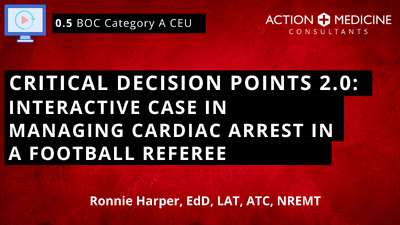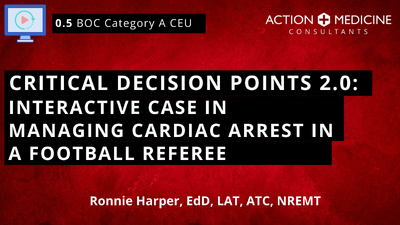General Course Information
Learning Material
Course Info (BOC Domains of Athletic Training; Presentation Description; Learning Objectives; Clinical Practice Gap Statement; Clinical Bottom Line)
BOC Domains of Athletic Training:
- Domain II - Assessment, Evaluation and Diagnosis
- Domain III - Critical Incident Management
- Domain IV - Therapeutic Intervention
Course Description:
In this dynamic session, participants are invited into an immersive learning experience centered around managing cardiac arrest scenarios. Through the lens of two compelling case studies, including a football referee suffering from cardiac arrest, attendees will explore the intricacies of emergency assessment, timely intervention, and the critical importance of scene management. The session promises a deep dive into the essential steps of cardiac emergency care, from initial assessment to the application of life-saving techniques, all within an interactive format designed to enhance learning through participation.
Learning Objectives:
- Recognize early signs of cardiac arrest in non-traditional patients such as football referees and understand the implications for immediate action.
- Recognize the importance of performing a rapid and effective scene size-up, identifying and mitigating environmental risks, securing the scene, and assessing the need for additional resources or medical personnel.
- Apply best practices for cardiac arrest management, including the use of Automated External Defibrillators (AEDs) and CPR, while ensuring effective communication and coordination with EMS and other onsite medical personnel.
Clinical Practice Gap Statement:
There exists a critical need to enhance the competency of athletic trainers in identifying and managing sudden cardiac arrest, particularly in non-athlete populations present at athletic events. This session aims to bridge the gap by providing hands-on, scenario-based learning opportunities that improve recognition of cardiac emergencies and the application of immediate, life-saving interventions.
Clinical Bottom Line Statement:
Effective management of cardiac arrest in athletic settings requires not only a strong foundation in emergency care principles but also the ability to adapt to unique challenges and make swift decisions. By enhancing situational awareness, assessment skills, and intervention strategies, athletic trainers can significantly improve outcomes in cardiac emergency scenarios.


